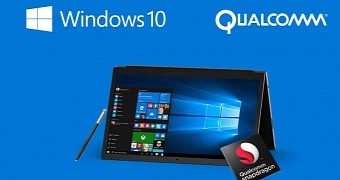Microsoft and Qualcomm are working on bringing the full version of Windows 10 on devices with ARM chips, and the two companies have already presented a demo highlighting the power of this mix, which can even handle demanding apps like Photoshop.
But at the MWC tech conference in Barcelona, Qualcomm discussed the partnership with Microsoft in detail, explaining that the two are trying to avoid the Windows RT disaster by enabling full Win32 apps.
“The goal is to get something credible out, show people why it’s different from RT. Show that it’s Windows 10 - there isn’t a second version of Windows 10,” Keith Kressin, senior vice president of product management at Qualcomm Technologies, was quoted as saying.
Windows RT is an operating system that was released by Microsoft in 2012 on the Surface RT and which was also developed for ARM chips. But as compared to this new project, Windows RT couldn’t run Win32 apps unless specifically whitelisted by Microsoft, and was limited to apps in the Windows Store. Due to lack of apps, however, Windows RT failed to gain traction, eventually becoming just a failure.
Ready for VR
With Windows 10 on ARM, Microsoft and Qualcomm are trying to offer a more compelling feature package as part of a concept described as “cellular PCs.” Qualcomm says these devices “won’t be extremely low-cost, but they also won’t be too expensive,” which should make them available to a wide array of potential buyers.
These cellular PCs won’t arrive on the market in high numbers, Qualcomm explained, and only a few models will be available at first, with both Dell and HP already expressing interest in adopting ARM chips for Windows 10 devices.
Qualcomm explains that while cellular PCs will be able to run full Win32 apps, they won’t provide the gaming performance that you find on a high-end desktop, and they will be primarily focused on browsing and working with documents.
ARM chips could also be used on Windows Holographic headsets, but Microsoft is yet to make a decision in this regard, with Qualcomm hinting that its chips could also support the VR platform.

 14 DAY TRIAL //
14 DAY TRIAL //